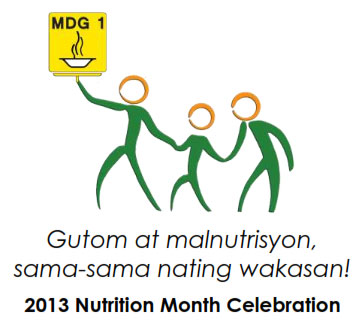
1. What is Nutrition Month?
2. What is the theme and objectives of Nutrition Month 2013?
3. What is hunger?
4. Why focus on hunger?
5. What is the state of hunger in the Philippines?
6. What are the goals on hunger?
7. What are the causes of hunger?
8. What is the right to food?
9. What are the consequences of hunger?
10. Does climate change contribute to hunger?
11. How can rice self-sufficiency contribute to hunger reduction among Filipinos?
12. What government policies and programs address hunger and malnutrition?
13. What are actions to reduce hunger and malnutrition?
14. What can families and individuals do to help reduce hunger and malnutrition?
15. What are the ways to celebrate Nutrition Month 2013?
1. What is Nutrition Month?
Nutrition Month is the annual campaign held every July to create greater awareness on nutrition among Filipinos (Presidential Decree 491 or the Nutrition Act of the Philippines). The National Nutrition Council (NNC) coordinates the nationwide celebration including the identification of an annual theme to focus on a priority nutrition concern.
2. What is the theme and objectives of Nutrition Month 2013?
The 39th Nutrition Month celebration focuses on hunger with the theme "Gutom at malnutrisyon, sama-sama nating wakasan!” (Hunger and malnutrition, let us end it together!). The theme undescores the need for active multi-stakeholder participation to address the basic causes of hunger.
The objectives of this year’s celebration are to:
- increase awareness on hunger issues and actions to mitigate hunger and malnutrition;
- encourage stakeholders to contribute to addressing hunger issues; and
- advocate for stronger political action to end hunger.
3. What is hunger?
Hunger is a condition in which people do not get enough food to provide the nutrients for fully productive, active and healthy lives (FAO). Prolonged hunger can lead to malnutrition and even death. Hunger is a form of food insecurity. There is no hunger when there is food security or when ”all people, at all times, have physical, social and economic access to sufficient, safe and nutritious food which meets their dietary needs and food preferences for an active and healthy life.”
4. Why focus on hunger?
The NNC Technical Committee has approved the focus of this year’s NM to focus on hunger. First, hunger is one of the worst forms of deprivation particularly because people do not enjoy their basic fundamental right – the right to food. Second, there is also the need to fast track actions to reduce hunger to meet the first Millennium Development Goal on eradicating extreme poverty and hunger. Third, hunger incidence in the Philippines has worsened in recent years affecting more Filipino families. And fourth, addressing hunger contributes to national growth and development.
5. What is the state of hunger in the Philippines?
Hunger in the country is measured using different parameters. While different measures are used, these are consistent in that the hunger problem in the Philippines has worsened in the last few years.
a. Food threshold or food poverty
The official indicator for measuring hunger incidence is the subsistence incidence or food poverty generated from the results of the Family Income and Expenditure Survey (FIES) which is done by the National Statistics Office every three years. The most recent FIES in 2012 revealed that food poverty or subsistence incidence was estimated at 10.0 percent in the first semester of 2012. The figure has not significantly changed from the first half of 2009 at 10.0 percent and 10.8 percent in the first half of 2006.
Food poverty which is also the food threshold is the minimum income required by an individual to meet his/her basic food needs and satisfy the nutritional requirements set by the Food and Nutrition Research Institute (FNRI). During the first semester of 2012, a Filipino family of five needed Php5,458 to meet basic food needs every month. Food poverty is also described as extreme poverty.
b. Food insecurity
The 2008 National Nutrition Surveys showed that 28.6% of mothers/caregivers experienced food insecurity. Among households, 72.7% were considered food insecure because they suffered anxiety that food may run out before they can get money to buy more and/or food bought did not last and they did not have enough money to get more at least once during the past three months before the interview.
The survey also identified the coping mechanisms to food insecurity, as follows:
- Skipping meals
- Borrowing money and food from relatives, friends and neighbors
- Buying food on credit
- Adults eating less frequently
- Reducing portion sizes
- Shifting to less expensive foods like root crops, corn, banana
- Skipping school
- Working abroad
Percentage of food insecure mothers/caregivers and children, and frequency of experience during the past 3 months before the survey: Philippines, 2008
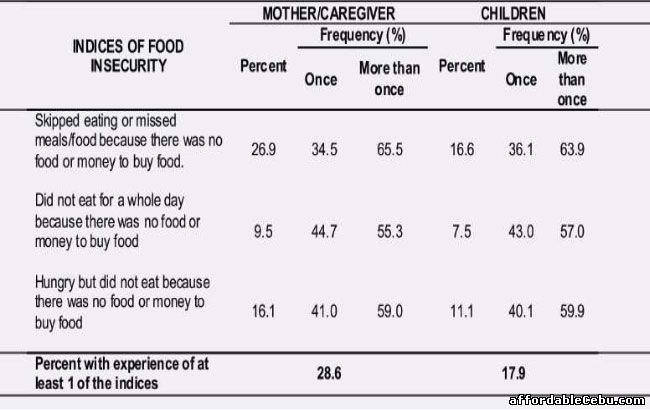
Source: Facts and Figures 2008 DOST-FNRI
c. Dietary adequacy and underweight for age
For the Millennium Development Goals, there are two measures for hunger. First, hunger is measured in terms of whether households are eating enough to satisfy their requirements for energy (calories). Data from the National Nutrition Surveys show that the percent of households with daily intake below the recommended 100% dietary energy requirement, actually increased from 57% in 2003 to 66.9% in 2008.
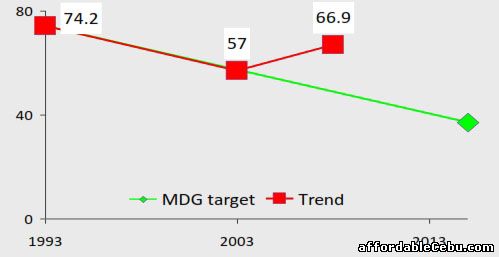
The other measure is the prevalence of underweight-for-age children below five years. Based on the latest survey, the prevalence of underweight-for-age among preschoolers was at 20.2% in 2011. This is slightly lower than the prevalence in 2008 which is 20.6%.
Trends in undernutrition among under-five children, Philippines.
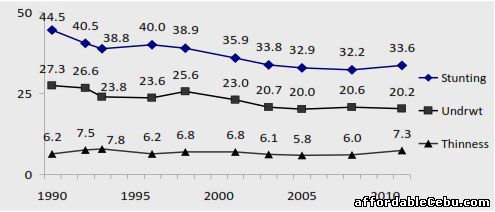
d. Self-rated hunger incidence
The Social Weather Stations, a private, non-stock and non-profit social research organization, conducts quarterly self-rated hunger surveys. Hunger refers to the involuntary suffering because respondents answer a survey question that specifies hunger due to lack of food to eat. The SWS asks 1,200 Filipino respondents: "In the last 3 months, did it happen even once that your family experienced hunger and did not have anything to eat?” Those who answered "Yes” were further asked: "Did it happen only once, a few times, often or always?” The survey classified experiencing hunger "only once” or "a few times” as "moderate hunger,” while going hungry "often” or "always” was rated as "severe hunger”.
Based on the SWS, the average overall hunger was 14.5% from July 1998 to March 2013. The average incidence for moderate hunger was 10.8% and severe hunger at 3.7% in the same period.
In the First Quarter 2013 Social Weather hunger survey, 19.2% or an estimated 3.9 million families experienced involuntary hunger at least once in the past three months. This is higher than the December 2012 survey result of 16.3% with an estimated 2.2 million families affected.
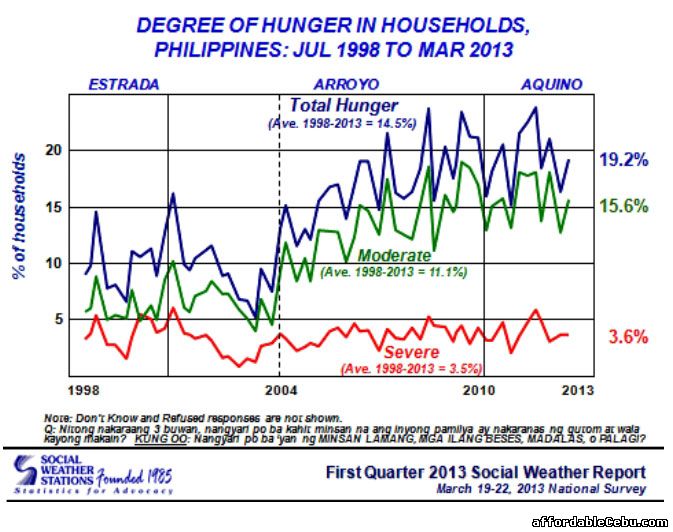
6. What are the goals on hunger?
The first goal of the Millennium Development Goals is to eradicate extreme poverty and hunger. The Philippines as a signatory to the MDG targets to:
- reduce by half the prevalence of underweight-for-age under-fives from 27.3% in 1990 to 13.7% in 2015
- reduce by half the percent of households with inadequate energy intake from 74.2% in 1993 to 37.1 % in 2015
In addition to the MDGs, the Philippine Plan of Action for Nutrition 2011-2016 provides the targets for reducing hunger particularly:
- Reduce the percent of households with inadequate calorie intake from 66.7% in 2008 to 32.8% in 2016.
- Reduce the prevalence of underweight under-five children from 20.6% in 2008 to 12.7% in 2016.
7. What causes hunger?
The following are factors that contribute to the world’s hunger:
- Poverty - Poor people do not have the resources like land, tools or money which are needed to grow or buy food on a daily basis.
- Armed conflict - War or peace and order problems affect agricultural production as well as food distribution, access and prices. Likewise, governments often spend more on arms than on social programs.
- Natural disasters – typhoons, floods, drought and other calamities can lead to severe food insecurity among those who are affected
- Environmental degradation –increasing environmental abuse decreases agricultural and fishery output
- Rapid population growth - particularly in urban areas make it harder for poor people to feed themselves.
- Lack of agricultural infrastructure – Lack of farm-to-market roads, post-harvest and irrigation facilities, and modern technology all affect food availability and access.
- Food prices – increasing food prices directly affect the people’s capacity to buy food.
The study conducted by Mapa, et. al, showed that food inflation and underemployment are important determinants of hunger incidence in the Philippines. The analysis showed that "a one-time increase in food prices can lead to increases in hunger incidence that will last for five quarters, while a one-time increase in underemployment will lead to increases in hunger incidence for two quarters.” In the study, underemployment was defined as proportion of the underemployed persons to the total population 15 years old and up. Underemployed persons include all employed persons who express the desire to have additional hours of work in their present job or an additional job, or to have a new job with longer working hours. Visibly underemployed persons are those who work for less than 40 hours during the reference period and want additional hours of work (NSO, 2010). Food inflation on the other hand used the food component of the Consumer Price Index.
Data from the "Right to Food Assessment” of the FAO on the profiles of hunger and analysis of its causes revealed the following:
- Bigger households tend to experience hunger more than smaller households. Hunger incidence increases sharply starting with 4-5 household members.
- Hunger incidence doubles among households with three to four children compared with at most two children. Households with seven or more children had higher hunger incidence with most of these households experiencing severe to chronic hunger.
- Better educated household heads have lower incidence of hunger compared to household heads not completing any grade level.
- Hunger incidence is highest among those working in agriculture, construction and mining, contractual workers, minimum wage-earners and those who are self-employed.
8. What is the right to food?
At the 2002 World Food Summit in Rome, the right to food was defined as "the right to have a regular, permanent and unrestricted access, either directly or by means of financial purchases, to quantitatively and qualitatively adequate and sufficient food corresponding to the cultural traditions of the people to which the consumer belongs and which ensure a physical and mental, individual and collective, fulfilling and dignified life free of fear.”
Simply put, the right to adequate food is realized when every man, woman and child, alone or in community with others have the physical and economic access at all times to adequate food or means for its procurement. The right to food protects the right of all human beings to be free from hunger, food insecurity and malnutrition.
9. What are the consequences of hunger?
People who suffer from hunger for longer periods are undernourished. Hunger for a long period of time can lead to:
- High Infant Mortality Rates - Malnourished women are more likely to be sick, give birth to smaller babies or with low birthweight who are at-risk of dying early, resulting in high levels of infant mortality where chronic hunger is a problem.
- Poor health status – Chronically hungry children and adults become weak and unable to fight common diseases due to weakened immune system. Undernutrition among the elderly speeds up the onset of degenerative diseases.
- Impaired physical and mental development – Chronic hunger deprives children of the essential proteins, micronutrients and fatty acids they need to grow adequately. Hungry children are also less sociable and less likely to explore and learn from their surroundings which affect their ability to learn at an early age.
- Acute vulnerability in times of disaster – poor families are already living on the edge of survival. Disasters such as floods, earthquakes, drought and typhoons can easily affect the families and in extreme cases, death to some of the family members.
- Hindrance to economic growth – Children who are experiencing chronic hunger could suffer permanent physical and cognitive damage. This will affect their future health, welfare and economic well-being. For developing countries, the impact on their ability to raise a productive workforce can last for generations, while in the shorter term, rising food prices can worsen inequality and may lead to conflict and political instability.
10. Does climate change contribute to hunger?
The UN World Food Programme states that "climate change is a hunger risk multiplier that threatens to undermine hard-won gains in eradicating hunger and poverty”. Current projections indicate that unless considerable efforts are made to improve vulnerable group’s adaptability to changes, 20 percent more people will be at risk of hunger by 2050 due to changing climate.
Undernutrition is a determinant of poor health and it is women and children who suffer the most. A 2012 report from the World Health Organization – The Partnership for Maternal, Newborn and Child Health stated that climate change will also affect food prices. Also that hunger may be the largest impact of climate change on earth.
11. How can rice self-sufficiency contribute to hunger reduction among Filipinos?
Rice is the staple food of Filipinos. While the Philippines is a rice-producing country, demand for this agricultural product is more than the supply such that the country has to resort to importation. In fact, the nation is one of the largest importers of rice in the world, leaving it particularly vulnerable to high and volatile rice prices. Increase in the price of rice due to lack of supply therefore affects many marginalized Filipinos who subsist mainly on rice to address their hunger pangs.
For the country to attain rice self-sufficiency, President Aquino declared 2013 as the National Year of Rice (NYR) through Proclamation No. 494. The Department of Agriculture (DA) leads the campaign together with the Philippine Rice Research Institute (PhilRice). DA and PhilRice are working together toward reducing poverty and hunger by focusing on producing and distributing high-quality and improved rice seeds; developing varieties that are able to withstand flooding and drought; and exploring new and modern farming systems or technologies for better yield. The program aims to increase total production from 15.77 million metric tons in 2010 to 22.73 metric tons by 2016 at an average growth of 6% per year. One of the strategies of the NYR is to reduce rice wastage and increase the consumption of unpolished or brown rice and rice alternatives such as rootcrops.
Achieving rice self-sufficiency means better productivity and better income particularly for farmers. Farmers will directly benefit from rice self-sufficiency through improved household income and household food consumption. Rice self-sufficiency means lower price of rice that will enable consumers to fulfil their staple food requirements as well as diversify their diet with other nutritious foods such as fish, meat, fruits and vegetables.
12. What government policies and programs are in place to address hunger and malnutrition?
a. Philippine Plan of Action for Nutrition.
The country’s framework for nutrition improvement. It aims to reduce hunger and malnutrition through the implementation of priority actions.
- Promote desirable infant and young child feeding
- Micronutrient program (food fortification and micronutrient supplementation)
- Home, school and community food production
- Integrated Management of Severe and Acute Ma ln utrition
- Supplementary feeding for pregnant women and 6-23 months old children
- Nutrition education
- Livelihood programs
- Sanitary toilet facilities
- Safe drinking water supply
- Promotion of desirable nutrition and healthy lifestyle behaviors
- Nutrition in Disaster and Risk Reduction Management
- Nutrition-Sensitive Agriculture and Development Programs
b. Pantawid Pamilya Pilipino Program (4Ps)
It is a human development program of the national government investing on health and education among poor households, particularly of children 0-14 years old. It provides cash assistance to poor families to alleviate their immediate needs such as food, health and education and also aims to break the intergenerational poverty cycle through investments in human capital.
c. Agrikulturang Pilipino or Agri-Pinoy
It is the overall strategic framework of the Department of Agriculture that guides the various services and programs of the DA from 2011-2016 and beyond. Agri-Pinoy has 4 guiding principles, namely: food security and self-sufficiency, sustainable agriculture and fisheries, natural resource management, and local development. The principle of food security and self-sufficiency seeks to meet the food needs of the Philippines, particularly staple food, and make these accessible, affordable, safe and nutritious.
13. What are actions to reduce hunger and malnutrition?
a. Ensure food security. Everyone must have access to enough nutritious food all year long. People should be able to buy it, grow it, or get it through a safety net mechanism.
b. Prevent child undernutrition by ensuring proper nutrition in the first 1,000 days of life, i.e. for the first nine months while in the womb, and from birth up to 23 months or before the child’s second birthday.
c. Develop sustainable food systems that will provide food for the people, preserve the environment and resilient to the changing climate.
d. Increase smallholder farmers’ productivity and income while creating decent employment. Improvements in their well-being create employment, cut poverty, increase the food supply, and stabilize prices for everyone.
e. Prevent food wastage. Produce and consume food sensibly. Wasted food means wasted water, soil, energy and effort.
14. What can families and individuals do to help reduce hunger and malnutrition?
a. Breastfeed babies exclusively from birth up to six months then give appropriate complementary food while continuing breastfeeding up to 2 years and beyond. Breastfeeding is a family’s best anti-poverty and anti-hunger strategy.
b. Establish home, community and school vegetable gardens, raise poultry, small animals or fish both for home consumption and for selling to augment household income. Consume indigenous vegetables.
c. Support local farmers by buying locally-grown foods.
d. Cook and eat just enough food to avoid food wastage.
e. Support feeding programs in the community particularly for pregnant women and the provision of complementary foods to children 6-23 months old.
f. Be informed. Know, practice and spread good nutrition.
15. What are the ways to celebrate Nutrition Month 2013?
a. Spread the message. Hang Nutrition Month streamers in façade of offices and other strategic places.
b. Be informed. Conduct and attend seminar or similar activities on hunger and malnutrition.
c. Be concerned. Conduct feeding programs for poor families particularly pregnant women and 6-23 months old children.
d. Provide livelihood opportunities for poor families including livelihood trainings and seminars.
e. Plant now. Establish home and community vegetable gardens for increased food supply.
f. Provide for the future. Sponsor nutrition projects and activities by the local government units
g. Be a supporter for sustainability. Donate to organizations conducting hunger programs and other humanitarian assistance such as Pondo ng Pinoy, UN World Food Programme, UNICEF etc.
References:
Abad Santos, C.O., Edillon, R.G., Piza, F.A. Causes of Hunger: A Profile of Hunger and Analysis of its Causes. FAO Profile, The Right to Food Assessment. Available at: http://www.fao.org/docrep/01 6/ap597e/ap597e.pdf (Accessed 10 June 2013)
Department of Agriculture. Food Staples Sufficiency Program 2011-2016. Available at: http://www.philrice.gov.ph/images/other_products/knowpro/Food-Staples-Sufficiency-Program.pdf (Accessed 27 March 2013)
Department of Social Welfare and Development. Pantawid Pamilyang Pilipino Program. Available at: http://pantawid.dswd.gov.ph/ (Accessed 4 April 2013)
Food and Agriculture Organization of the United Nations. Hunger statistics and FAQs. Available at: http://www.fao.org/hunger/en/ (Accessed 7 March 2013)
Food and Nutrition Research Institute – Department of Science and Technology (FNRI – DOST). Philippine Nutrition Facts and Figures 2011. Available at:
http://www.f nri.dost.gov.ph/images/stories/8th N NS/fnri_facts%26figures2011.p df (Accessed 4 April 2013)
Mapa, D. S., Han, F.C. and Estrada, K.C. (July 2010) Hunger Incidence in the Philippines: Facts, Determinants and Challenges. UPSS Working Paper No. 2010-08.
National Statistics Office. Technical Notes on the Family Income and Expenditure Survey (FIES) Available at: http://www.census.gov.ph/article/technical-notes-family-income-and-expenditure-survey-fies (Accessed 12 April 2013)
Social Weather Stations. First Quarter 2013 Social Weather Survey. Available at: http://www.sws.org.ph/pr20130524.htm (Accessed 10 June 2013)
UN World Food Programme. Climate Change. Available at: http://www.wfp.org/climate-change (Accessed 26 March 2013)
Virola, R.A. Hungry for Hunger Statistics? Available at:
http://www.nsc b.gov.ph/head lines/StatsSpeak/20 11/05091 1_rav.asp (Accessed 12 April 2013)